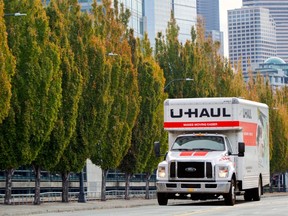This study shows where everyone moved to when they left the big cities last year
While B.C. ranked second for in-migration, far fewer moved to its more expensive cities

Article content
When the pandemic begin in 2020, larger cities across Canada saw an exodus of people to small towns and rural areas. One company keeping track of such movement is U-Haul, the truck rental company for DIY movers.
Its annual Growth Index study examines moving patterns, calculating the net gain of one-way U-Haul trucks arriving in a city or province, versus departing from that city or province, in a calendar year. U.S. movements into Canada were calculated as well, but because of pandemic restrictions, the numbers were likely negligible.
“While U-Haul migration trends do not correlate directly to population or economic growth,” the company says, “the U-Haul Growth Index is an effective gauge of how well cities are both attracting and maintaining residents.”
People moving last year eschewed British Columbia for Alberta. B.C. fell from the No. 1 spot in 2020 to No. 2 last year, replaced at the top by Alberta.
“Alberta is one of best places to make a home,” says U-Haul’s district vice-president of Western Canada Naga Chennamsetty. “In the last year, we have seen a lot of movement into Alberta.”
Chennamsetty said in a release that “there are initiatives in Alberta that are creating more job opportunities and attracting residents.”
Of the top 25 Growth Cities nationally, three are in Alberta. Red Deer-Lacombe came in eighth, Medicine Hat-Redcliff 15th and Airdrie 24th. All three are in roughly the southern fourth of the province. Lethbridge also grew from inflow but missed the Top 25 cutoff. Airdrie saw slightly fewer people move in, dropping to 24th place from 19th.
Indicative of their recent growth spurt, neither Red Deer nor Medicine Hat were on U-Haul’s growth list for 2020 year at all.

While Calgary’s top rank in inflow helped land Alberta at the top of the provincial listings for net growth, Ontario saw a wider distribution of people. For a second year running, the top urban growth in Canada occurred in North Bay, followed by Belleville and Greater Sudbury. Richmond Hill, at Toronto’s northern border, also saw high growth but just missed the study’s Top 25 cutoff.
The number of DIY movers settling in North Bay rose 40 per cent year-over-year, while departures rose just 27 per cent. These one-way customers accounted for 59.2 per cent of all U-Haul traffic in the city in 2021, meaning that more people were moving into the town than were simply moving within it.
U-Haul’s Eastern Canada area vice-president Jake Spelic says in the release that, while Ontarians moved in vast numbers to the Maritimes after the pandemic hit, “as time has passed and things shift closer to normal, we are starting to see that trend reverse. Ontario is still the economic centre of Canada and offers a high quality of living, thousands of job opportunities and attractive salaries.”
Toronto did not make the Top Growth Cities list for DIY movers, but many of the Ontario cities that did are in the populous southern Ontario region. Six urban areas in the Golden Horseshoe hit the chart for growth, from Chatham at No. 13 to St. Catharines at No. 25.
In B.C., Kelowna hit sixth on the Growth Cities list, Kamloops 11th and Penticton 21st. None of the three was on the previous year’s list. Apparently reflective of the more expensive real estate, people bypassed the cities of North Vancouver, which slipped to 10th spot from second in 2020; Abbotsford to 22nd from 11th; while Vancouver plummeted to 23rd from seventh.
Chilliwack, just east of Abbotsford, just missed the Top 25 list.
Quebec City posted a dramatic climb to fourth place from 16th on the list. It was the only city in Quebec to make the Growth Cities ranking, though Gatineau and Sherbrooke came close to making the list.
Our website is the place for the latest breaking news, exclusive scoops, longreads and provocative commentary. Please bookmark nationalpost.com and sign up for our daily newsletter, Posted, here.













Postmedia is committed to maintaining a lively but civil forum for discussion. Please keep comments relevant and respectful. Comments may take up to an hour to appear on the site. You will receive an email if there is a reply to your comment, an update to a thread you follow or if a user you follow comments. Visit our Community Guidelines for more information.